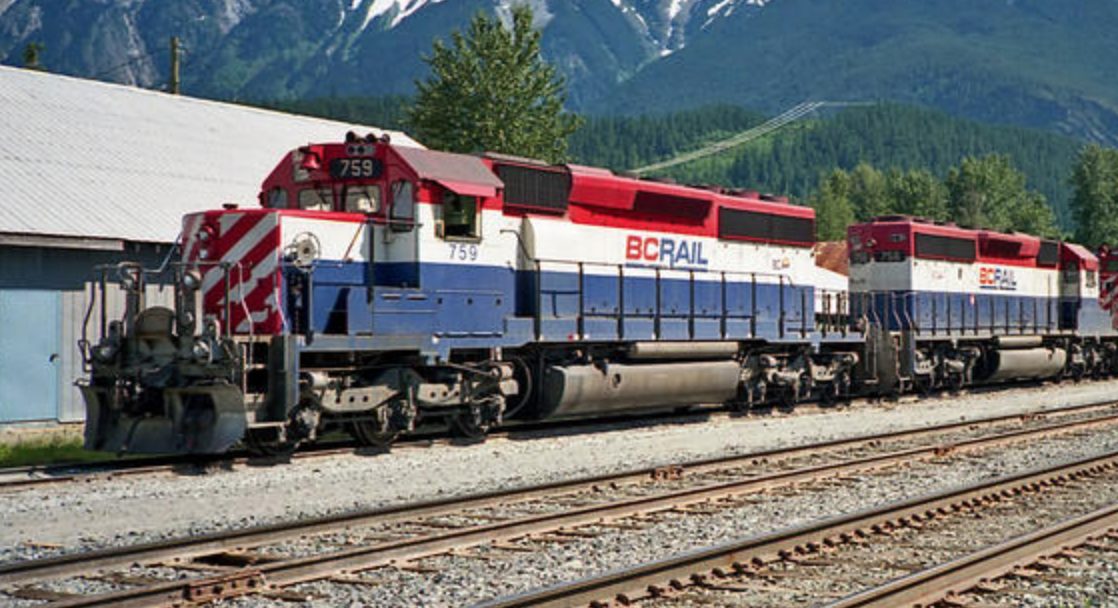
Bob Mackin
A decade-and-a-half after reaching a truce, the Competition Bureau is investigating CN for alleged breach of the agreement that allowed the controversial privatization of BC Rail.
“The Commissioner has reason to believe that CN is in violation of certain commitments under the [consent] agreement,” said Jayme Albert of the Competition Bureau. “To that end, on July 4, 2019, the Bureau filed applications with the Federal Court of Canada for orders under section 11 of the Competition Act requiring Canadian Pacific Railway Limited, West Fraser Timber Co. Ltd., Canfor Corporation, Tolko Industries Ltd., Conifex Timber Inc. and Carrier Lumber Ltd. to provide the Bureau with information related to its inquiry.”

BC Rail train in 1995 (Trainspotted.com)
Albert said the Commissioner believes the six lumber companies and the railway have or are likely to have information relevant to the Bureau inquiry. The reopening of the deal was first reported by Blacklock’s Reporter.
On July 2, 2004 the Commissioner of Competition and BC Rail and CN committed to “specific, enforceable and transparent standards and covenants to prevent anti-competitive behaviour.”
The consent agreement included sections on benchmark transit times, car allocation, and Peace River grain commitments.
“Commissioner has expressed concerns that without the specific commitments contained herein there is a reasonable likelihood that CN could use the market power it may acquire as a result of the transaction to substantially prevent and/or lessen competition in the affected product or geographic markets,” said the consent agreement.
CN spokesman Jonathan Abecassis said the company is cooperating.
“CN has been cooperating with the Competition Bureau in its investigation of a program CN implemented throughout its Canadian network to reduce car cycle time, improve rail car utilization and increase car availability to the greatest number of lumber producers,” Abecassis said.
BC Rail still exists because it officially retains ownership of the tracks on which CN runs. Deputy Minister of Transportation and Infrastructure Grant Main is the chair. He did not respond to questions from theBreaker.news. A prepared statement delivered by Danielle Pope of the ministry said “It’s our understanding from the court records that the competition bureau is investigating a service complaint from a private company against CN. It would be inappropriate for either the Ministry or BC Railway to comment on an ongoing competition bureau investigation.”
The Gordon Campbell-led BC Liberals won the 2001 election on a platform that included a promise not to privatize BC Rail. After gaining power, Campbell switched gears and put the railway on the block.

Ex-CN chair David McLean (McLean Group)
The sale was fraught with controversy. Bidders CP and Burlington Northern Santa Fe both dropped out, both suggesting CN had the inside track. OmniTrax was the only other bidder, which had previously partnered with BNSF. CN, chaired by BC Liberal bagman David McLean, eventually paid $1 billion for BC Rail in November 2003. In late December of that year, however, police raided offices at the Legislature and took away numerous banker’s boxes of evidence.
The Adrian Dix-led NDP lost the 2013 election by surprise after a platform that included a promised public inquiry into the BC Rail sale.
In June, theBreaker exclusively reported that the federal government dropped a bizarre tax case against Dave Basi and Bob Virk, whose defence lawyers were paid $6.2 million after they agreed to a plea bargain that resulted in two years house arrest and probation for breach of trust. Basi and Virk had maintained their innocence until the deal, which halted their B.C. Supreme Court trial before former Finance Minister Gary Collins was to testify.
The federal government deemed the payments to lawyers a taxable benefit and reassessed their incomes. Their lawyer, David Mulroney, told the Federal Court in a July 2016 filing that there was no evidence the province had ever intended to confer a benefit and both Basi and Virk were no longer employees.
The province was funding a very expensive trial and wanted out from under that cost, which was out of all proportion to any potential recovery and needed an acceptable outcome. Employment had long since ended and was not then relevant to the decision.”
The federal government settled with Basi and Virk two weeks before a scheduled June 24 Victoria hearing. The assessments were reversed in exchange for a waiver of costs.
Support theBreaker.news for as low as $2 a month on Patreon. Find out how. Click here.











